| dc.contributor.author | Das, Pankaj Kumar | en_US |
| dc.date.accessioned | 2020-10-05T13:10:11Z | |
| dc.date.available | 2020-10-05T13:10:11Z | |
| dc.date.issued | 2015 | |
| dc.identifier.citation | Das, P. K. (2015). Codes correcting key errors. TWMS Journal of Applied and Engineering Mathematics, 5(1), 110-117. | en_US |
| dc.identifier.issn | 2146-1147 | |
| dc.identifier.issn | 2587-1013 | |
| dc.identifier.uri | https://hdl.handle.net/11729/2553 | |
| dc.identifier.uri | http://jaem.isikun.edu.tr/web/index.php/archive/89-vol5no1/202 | |
| dc.description.abstract | The objective of coding theory is to protect a message going through a noisy channel. The nature of errors that cause noisy channel depends on different factors. Accordingly codes are needed to develop to deal with different types of errors. Sharma and Gaur [6] introduced a new kind of error which is termed as ‘key error’. This paper presents lower and upper bounds on the number of parity-check digits required for linear codes capable of correcting such errors. An example of such a code is also provided. | en_US |
| dc.language.iso | eng | en_US |
| dc.publisher | Işık University Press | en_US |
| dc.rights | info:eu-repo/semantics/openAccess | en_US |
| dc.rights | Attribution-NonCommercial-NoDerivs 3.0 United States | * |
| dc.rights.uri | http://creativecommons.org/licenses/by-nc-nd/3.0/us/ | * |
| dc.subject | Parity check matrix | en_US |
| dc.subject | Syndrome | en_US |
| dc.subject | Standard array | en_US |
| dc.subject | Solid burst error | en_US |
| dc.title | Codes correcting key errors | en_US |
| dc.type | article | en_US |
| dc.description.version | Publisher's Version | en_US |
| dc.relation.journal | TWMS Journal of Applied and Engineering Mathematics | en_US |
| dc.identifier.volume | 5 | |
| dc.identifier.issue | 1 | |
| dc.identifier.startpage | 110 | |
| dc.identifier.endpage | 117 | |
| dc.peerreviewed | Yes | en_US |
| dc.publicationstatus | Published | en_US |
| dc.relation.publicationcategory | Makale - Uluslararası Hakemli Dergi - Başka Kurum Yazarı | en_US |




















